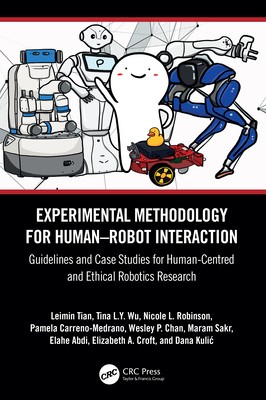
- We will send in 10–14 business days.
- Author: Leimin Tian
- Publisher: CRC Press
- ISBN-10: 1032693614
- ISBN-13: 9781032693613
- Format: 15.6 x 23.4 x 1.9 cm, kieti viršeliai
- Language: English
- SAVE -10% with code: EXTRA
Reviews
Description
Leading figures in Australian robotics research provide an overview and guidance for human-robot interaction (HRI) experimental design and evaluation methodologies that consider the ethical implications of the research and its applications from a human-centred and contextual perspective. The authors explain introductory and advanced topics in HRI with a focus on human-centred evaluation and ethical practices. They also provide an online interactive check-list tool for novice HRI researchers and students to deploy when designing their own studies.
The book is structured into three parts. In Part I, the authors first review fundamental methodologies and provide an interactive check-list tool of the HRI experimental study life cycle to guide beginners to the field. Part II introduces an expanded set of approaches to support researchers and practitioners to create high-quality study designs that draw on practices from human-computer interaction, human-centred artificial intelligence, psychology and social science, and advance ethical HRI research. Finally, in Part III, the authors discuss a selection of HRI studies as examples of how the introduced methodologies are adopted, which will support the readers to further understand the fundamental and advanced methodologies described in parts I and II. The diverse collection of case studies enables readers to grasp the state of the art and apply what they have learned in their own practices.
This book is a vital resource for both students new to the field and experienced researchers and practitioners. The book's practical focus and clear elucidation of relevant case studies, from its introduction to the HRI experimental study life cycle through to advanced methods emerging in the field, ensures that this will greatly benefit progress in the field with human-centred and ethical experimental methodology.
EXTRA 10 % discount with code: EXTRA
The promotion ends in 21d.20:34:45
The discount code is valid when purchasing from 10 €. Discounts do not stack.
- Author: Leimin Tian
- Publisher: CRC Press
- ISBN-10: 1032693614
- ISBN-13: 9781032693613
- Format: 15.6 x 23.4 x 1.9 cm, kieti viršeliai
- Language: English English
Leading figures in Australian robotics research provide an overview and guidance for human-robot interaction (HRI) experimental design and evaluation methodologies that consider the ethical implications of the research and its applications from a human-centred and contextual perspective. The authors explain introductory and advanced topics in HRI with a focus on human-centred evaluation and ethical practices. They also provide an online interactive check-list tool for novice HRI researchers and students to deploy when designing their own studies.
The book is structured into three parts. In Part I, the authors first review fundamental methodologies and provide an interactive check-list tool of the HRI experimental study life cycle to guide beginners to the field. Part II introduces an expanded set of approaches to support researchers and practitioners to create high-quality study designs that draw on practices from human-computer interaction, human-centred artificial intelligence, psychology and social science, and advance ethical HRI research. Finally, in Part III, the authors discuss a selection of HRI studies as examples of how the introduced methodologies are adopted, which will support the readers to further understand the fundamental and advanced methodologies described in parts I and II. The diverse collection of case studies enables readers to grasp the state of the art and apply what they have learned in their own practices.
This book is a vital resource for both students new to the field and experienced researchers and practitioners. The book's practical focus and clear elucidation of relevant case studies, from its introduction to the HRI experimental study life cycle through to advanced methods emerging in the field, ensures that this will greatly benefit progress in the field with human-centred and ethical experimental methodology.


Reviews